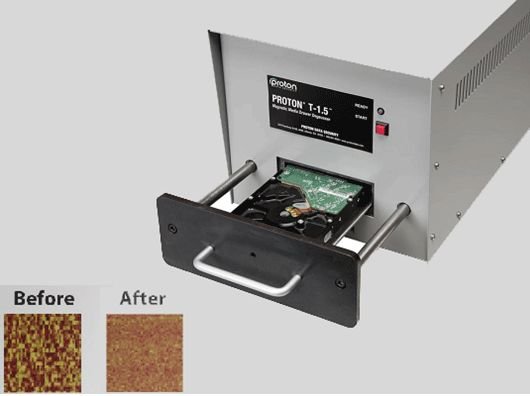Understanding Hard Drive Shredders
Hard drive shredders are specialized devices designed to physically destroy hard drives and other digital media, ensuring that sensitive data cannot be recovered. These shredders utilize various mechanisms to enhance data security and prevent unauthorized access. By understanding the functionalities and types of hard drive shredders, individuals and organizations can make informed choices regarding their data destruction needs.
There are two primary types of shredding mechanisms employed in hard drive shredders: blade shredders and particle shredders. Blade shredders utilize sharp blades to cut the hard drive into small fragments, rendering data irretrievable. The effectiveness of blade shredders can vary based on the size and configuration of the blades, as well as the speed of operation. On the other hand, particle shredders take a more advanced approach, breaking down the media into extremely small particles, often measuring less than 2mm. This level of destruction vastly reduces the chances of data recovery and is particularly beneficial for organizations dealing with highly sensitive information.
The degree of destruction offered by hard drive shredders is crucial when choosing the appropriate device for a specific application. Some shredders can achieve different levels of compliance with data destruction standards, including industry-specific regulations such as HIPAA or GDPR. Understanding these standards is essential for organizations that handle sensitive personal information or confidential business data, as failure to properly destroy such data can lead to severe repercussions.
In addition to their shredding capabilities, many modern hard drive shredders are equipped with advanced technology, such as automatic feed systems and digital controls, streamlining the shredding process. Such innovations not only enhance the efficiency of data destruction but also ensure that operators can execute their tasks safely and effectively. These features collectively contribute to the importance of investing in a reliable hard drive shredder as part of a comprehensive data security strategy.
Why Data Security Matters
In the modern digital landscape, data security has emerged as a critical concern for both individuals and organizations. As the volume of sensitive information grows, so does the risk of data breaches, identity theft, and unauthorized access to personal and proprietary information. Such events can lead to devastating consequences, including financial loss, reputational damage, and legal repercussions. The alarming rise in cybercrime underscores the importance of implementing robust data protection measures.
Data breaches can result from various sources, including external hackers, insider threats, and accidental data leaks. The ramifications of a breach can extend beyond financial losses; they may also include regulatory fines, loss of customer trust, and legal liabilities. For businesses, safeguarding sensitive client data is not just a matter of ethical responsibility but also a legal obligation. Regulations like the General Data Protection Regulation (GDPR) and the Health Insurance Portability and Accountability Act (HIPAA) have been instituted to emphasize the necessity of protecting personal data and ensuring that it is properly disposed of when no longer needed.
Compliance with these regulations mandates secure data destruction methods, allowing organizations to mitigate risks associated with data exposure. A hard drive shredder is an essential tool for ensuring complete data destruction, effectively rendering storage devices unusable and unrecoverable. By employing a hard drive shredder, businesses and individuals can ensure that sensitive information cannot be accessed or reconstructed by unauthorized individuals.
Moreover, the implementation of secure data destruction practices promotes a culture of responsibility regarding data management. Whenever sensitive data is phased out, organizations must ensure that they adopt measures that reflect their commitment to data security. In doing so, they not only protect their own interests but also uphold their duty to safeguard the privacy of those whose data they manage.
Benefits of Using a Hard Drive Shredder
Utilizing a hard drive shredder offers numerous advantages crucial for both individual users and businesses. One of the primary benefits is the provision of complete data destruction. Traditional methods of data deletion, such as formatting or using software, often leave residual data recoverable by unauthorized personnel. In contrast, a hard drive shredder physically destroys the hard drive, ensuring that sensitive information remains inaccessible, thus safeguarding against identity theft and data breaches.
Environmental considerations also play a significant role in the decision to use a hard drive shredder. When hard drives are shredded, the materials can be recycled responsibly, thereby mitigating the environmental impact of e-waste. Many shredders are designed to separate metals and plastics, allowing for proper recycling while reducing the amount of electronic waste that ends up in landfills. This not only enhances environmental protection but also promotes sustainable practices in data disposal.
Moreover, compliance with data protection laws is increasingly vital in today’s regulatory landscape. Organizations must adhere to various standards, such as the General Data Protection Regulation (GDPR) and the Health Insurance Portability and Accountability Act (HIPAA), which dictate stringent measures for handling sensitive data. Utilizing a hard drive shredder can help businesses meet these legal requirements, as it provides a verifiable method for destroying information that is no longer needed, minimizing the risk of non-compliance penalties.
Lastly, the use of a hard drive shredder affords users peace of mind. Both personal users disposing of old computers and businesses handling client data can feel secure knowing that their sensitive information is irretrievable. This assurance not only fosters trust among clients but also protects the reputation of a business. In today’s data-driven world, leveraging the benefits of a hard drive shredder is an essential practice for effective data security.
Choosing the Right Hard Drive Shredder
When it comes to safeguarding sensitive information, selecting the appropriate hard drive shredder is paramount. A wide variety of models are available, each tailored to specific needs and capacities. Understanding your requirements is the first step to making an informed purchase. For personal users, a smaller, portable hard drive shredder may suffice, allowing you to conveniently dispose of old data without taking up much space. Look for devices with a shredding capacity that matches your usage frequency, ideally able to handle several drives per session.
Small businesses typically require a shredder that balances performance with budget considerations. In this case, it’s advisable to choose a model that offers a higher shredding capacity and the ability to handle different types of media, including solid-state drives (SSDs). Features such as automatic feeding can save time, which is often in short supply for small business owners. Additionally, ensure that the shredder complies with relevant data destruction standards, providing peace of mind that your data is irretrievable.
For large corporations, investing in industrial-grade hard drive shredders is often the best course of action. These machines are designed for high volume and efficiency, capable of shredding multiple drives simultaneously. Consider equipment with advanced features including data logging and shred size specifications that meet or exceed industry standards. Furthermore, features like noise reduction and mobility can elevate operational efficiency and workplace comfort. Organizations should also evaluate the total cost of ownership, factoring in maintenance and operational costs over time.
In conclusion, choosing the right hard drive shredder is integral to data security. By assessing shredding capacity, size, portability, and essential features according to your unique requirements, you empower yourself or your organization to effectively protect critical information from unauthorized access. This deliberate approach ensures that you select a hard drive shredder tailored to your specific data disposal needs. Investing in the correct model will ultimately provide peace of mind, knowing that sensitive data has been permanently destroyed.







